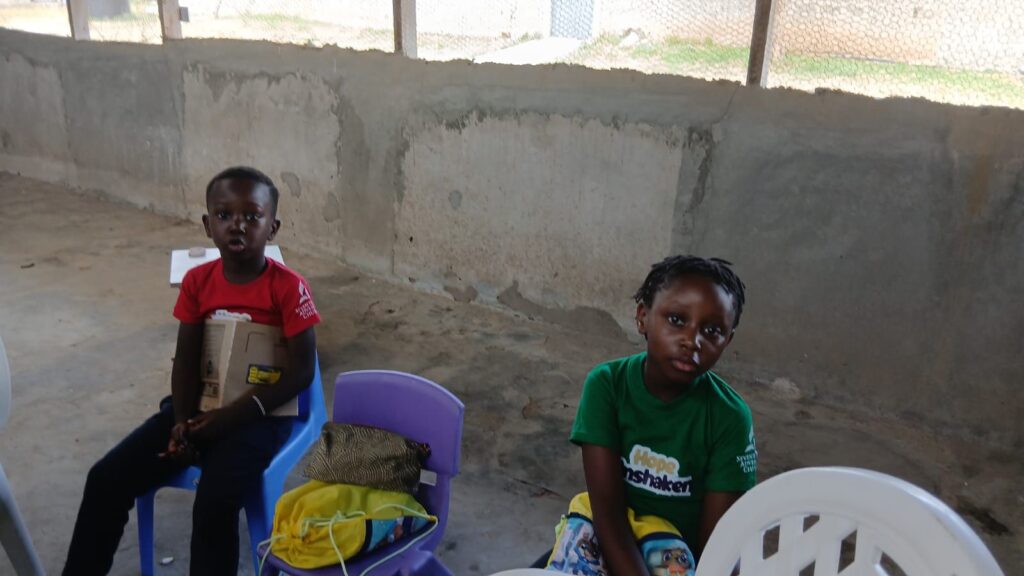MISSION
The mission of the Children’s Ministries Department is to nurture children into a loving, serving relationship with Jesus.
We seek to fulfill our mission by developing the following:
Grace-oriented ministries, in which all children will experience the unconditional love of Jesus, find assurance of acceptance and forgiveness, and make a commitment to Him and develop their faith.
Inclusive ministries, in which the volunteers who minister and the children to whom they minister will be valued and involved regardless of race, color, language, gender, age, abilities, or socio-economic circumstances;
Leadership ministries, in which volunteers are empowered, trained, and equipped for effective ministry to children;
Service-oriented ministries, in which children are given opportunities for hands-on service to people in their neighborhood or city, which could establish a pattern of outreach to others that may well continue through life;
Cooperative ministries, which involve working in partnership with other ministries, such as family ministries, Sabbath School, and stewardship, to support and help parents develop the faith of their children.
Safe ministries, whereby our churches adopt safeguards to protect children from physical, emotional, and spiritual abuse; to choose volunteers with high spiritual and moral backgrounds; and to minimize the church’s liability; and,
Evangelistic ministries, in which children who are not enfolded in the church family will be introduced to the love of Jesus through outreach-programs such as: Vacation Bible Schools, children’s branch Sabbath Schools, Neighborhood Bible Clubs, and Story Hours.Children’s Ministries
HISTORY OF THE GC CHILDREN MINISTRIES
WORK IN THE 1800’S
While it is true that Children’s Ministries did not become a full fledged department of the General Conference until 1995, the Seventh-day Adventist Church had long recognized the importance of ministering to children even back in the 1800’s. Work for children began in 1863 when Adelia Patten wrote a two-year series of lessons for children. From 1864 through 1888 children’s lessons were published in the Youth’s Instructor, most of which centered around biblical history and narrative Bible stories. In 1869 G. H. Bell wrote a series of lessons for children.
WORK IN THE EARLY 1900’S
In 1890 Our Little Friend began carrying the Sabbath School lessons for primary and kindergarten children which lasted for sixty seven years. In 1957.Our Little Friend began to have Sabbath School lessons for the Cradle Roll children together with the kindergarten children. Sabbath School lessons for primary children appeared in a new publication, Primary Treasure in 1957. Sabbath School quarterlies for primary and junior ages started in Australia in 1911-1913, and soon more quarterlies were produced for children for the rest of the English-speaking world. From 1933 to 1936 a series of five volumes called Bible Stories for the Cradle Roll appeared. Other curriculum materials for children appeared periodically, both from the General Conference Sabbath School Department and from active and enthusiastic teachers and personnel in local Sabbath Schools around the world.
In the 1960’s several men took an active part in the children’s ministries department: Curtis Barger, Tom Ashlock, and Ben Leibelt. Tom Ashlock was responsible for developing a new Vacation Bible School program, with pencil activities being placed in the Little Friend and Primary Treasurer.
At the same time, several women in North America who had a passion for children also developed materials for them. They were Maureen Luxton, Helen Craig, Louise Myers, and Alice Lowe. Louise Myers wrote a series of program books for the Cradle Roll and Kindergarten levels.
CHILDREN’S WORK UNDER CHURCH MINISTRIES
Although there was no organized departmental work for children, but at the 1985 General Conference session in New Orleans, the Church Ministries Department was created, which was formed from a merger of four departments: Sabbath School/Lay Activities, Stewardship and Development, Youth, and Home and Family Service. This department includes services and support for children’s ministries work, but it was not until the 1987 world advisory that children’s ministries emerged as a new ministry within the Church Ministries Department.
This department, in cooperation with the Review and Herald and Pacific Press publishing associations produced Sabbath school quarterlies for children. These included the Kindergarten Sabbath School Lessons, Primary Sabbath School Lessons, Junior Sabbath School Lessons, Earliteen Sabbath School Lessons, and Mission (children’s edition). The department also produced program helps for cradle roll, primary, and junior/earliteen Sabbath school leaders.
From 1985-1990, children’s ministries received its impetus from the vision and prompting of Helen Craig, former Sabbath School associate director for children’s Sabbath School, Vacation Bible School, and children evangelism. From 1990-1995, Virginia Smith led out in the work for children’s ministries as one of the various support ministries of the Church Ministries Department.
EMERGENCE OF THE DEPARTMENT
The 1995 General Conference session at Ultrecht marks a watershed for children’s ministries. On July 4, 1995, A. H. Tolhurst proposed a motion from the floor that the Children’s Ministries Department be established as a separate ministry, a separate department of the church. It was seconded and voted, and children’s ministries became the newest department of the church, the only department in history to be suggested from the floor at a session.
In the year 2000 a new children’s curriculum was written for the world church. This was a product of creative thinking and evaluation by many people from all the world divisions. Known as GraceLink, this new curriculum stresses four core aspects of the Christian faith:
Grace, God’s part in the plan of salvation;
Worship, our response to God’s saving initiative;
Community, how God’s grace compels us to live together in harmony as the family of God; and
Service, our response to God’s love as we reach out in soul winning and service to others.
Today, Children’s Ministries has become a worldwide ministry with every division in the world field having a director to oversee the work of spiritual nurturing and training for children.Children’s Ministries
Ellen White and Children
CHILDREN AND BAPTISM
“Parents whose children desire to be baptized have a work to do, both in self-examination and in giving faithful instruction to their children. Baptism is a most sacred and important ordinance, and there should be a thorough understanding as to its meaning. It means repentance for sin, and the entrance upon a new life in Christ Jesus. There should be no undue haste to receive the ordinance. Let both parents and children count the cost. In consenting to the baptism of their children, parents sacredly pledge themselves to be faithful stewards over these children, to guide them in their character building. They pledge themselves to guard with special interest these lambs of the flock, that they may not dishonor the faith they profess.” —Testimonies to the Churches, vol. 6, p. 93.
“Religious instruction should be given to children from their earliest years. It should be given, not in a condemnatory spirit, but in a cheerful, happy spirit. Mothers need to be on the watch constantly, lest temptation shall come to the children in such a form as not to be recognized by them. The parents are to guard their children with wise, pleasant instruction. As the very best friends of these inexperienced ones, they should help them in the work of overcoming, for it means everything to them to be victorious. They should consider that their own dear children who are seeking to do right are younger members of the Lord’s family, and they should feel an intense interest in helping them to make straight paths in the King’s highway of obedience. With loving interest they should teach them day by day what it means to be children of God and to yield the will in obedience to Him. Teach them that obedience to God involves obedience to their parents. This must be a daily, hourly work. Parents, watch, watch and pray, and make your children your companions.” – Testimonies to the Churches, vol. 6, p. 93.
“When the happiest period of their life has come, and they in their hearts love Jesus and wish to be baptized, then deal faithfully with them. Before they receive the ordinance, ask them if it is to be their first purpose in life to work for God. Then tell them how to begin. It is the first lessons that mean so much. In simplicity teach them how to do their first service for God. Make the work as easy to be understood as possible. Explain what it means to give up self to the Lord, to do just as His word directs, under the counsel of Christian parents.” – Testimonies to the Churches, vol. 6, p. 94.
“After faithful labor, if you are satisfied that your children understand the meaning of conversion and baptism, and are truly converted, let them be baptized. But, I repeat, first of all prepare yourselves to act as faithful shepherds in guiding their inexperienced feet in the narrow way of obedience. God must work in the parents that they may give to their children a right example, in love, courtesy, and Christian humility, and in an entire giving up of self to Christ. If you consent to the baptism of your children and then leave them to do as they choose, feeling no special duty to keep their feet in the straight path, you yourselves are responsible if they lose faith and courage and interest in the truth.” – Testimonies to the Churches, vol. 6, p. 94.
THE IMPORTANCE OF THE EARLY YEARS
“Too much importance cannot be placed upon the early training of children. The lessons learned, the habits formed, during the years of infancy and childhood, have more to do with the formation of the character and the direction of the life than have all the instruction and training of the after years.” Ministry of Healing, p. 380.
“It is during the first years of a child’s life that his mind is most susceptible to impressions either good or evil. During these years decided progress is made in either a right direction or a wrong one.” Child Guidance, p. 193.
“Many neglect their duty during the first years of their children’s lives, thinking that when they get older, they will then be very careful to repress wrong and educate them in the right. But the very time for them to do this work is when the children are babes in their arms. It is not right for parents to pet and humor their children; neither is it right for them to abuse them. A firm, decided, straightforward course of action will be productive of the best results.” Child Guidance, p. 194.
“Too much importance cannot be placed on the early training of children. The lessons that the child learns during the first seven years of life have more to do with forming his character than all that it learns in future years.” Child Guidance, p. 193
JESUS VALUES CHILDREN
“Those who love God should feel deeply interested in the children and youth. To them God can reveal His truth and salvation. Jesus calls the little ones that believe on Him, the lambs of His flock. He has a special love for and interest in the children. . . . The most precious offering that the children can give to Jesus, is the freshness of their childhood.” Reflecting Christ, p. 373.
“How interestedly the Lord Jesus knocks at the door of families where there are little children to be educated and trained! How gently he watches over the mothers’ interest, and how sad He feels to see children neglected. . . . In the home characters are formed; human beings are molded and fashioned to be either a blessing or a curse.” That I My Know Him, p. 39.
“As the children gathered the wildflowers growing so abundantly around them, and crowded up to present to Him their little offerings, He received them gladly, smiled upon them, and expressed His joy at seeing so many varieties of flowers.” The Upward Look, p. 57.
“These children were His heritage. He knew that He had come to ransom them from the enemy by dying on the cross of Calvary. He spoke words to them that ever after they carried in their hearts. They were delighted to think that He appreciated their gifts and spoke so lovingly to them.” Upward Look, p. 57.
“Christ watched children at their play, and often expressed His approval when they gained an innocent victory over something they were determined to do. He sang to children in sweet and blessed words. They knew that He loved them. He never frowned on them. He shared their childish joys and sorrows. Often He would gather flowers, and after pointing out their beauties to the children, would leave them with them as a gift. He had made the flowers and He delighted to point out their beauties.” Upward Look, p. 57.
“It has been said that Jesus never smiled. This is not correct. A child in its innocence and purity called forth from His lips joyous song.” Manuscript 20, Feb. 12, 1902, “Our Elder Brother.” Upward Look p. 57.
“God wants every child of tender age to be His child, to be adopted into His family.” Counsels to Teachers and Parents, p. 169.
“When Jesus told the disciples not to forbid the children to come to Him, He was speaking to His followers in all ages,–to officers of the church, to ministers, helpers, and all Christians. Jesus is drawing the children, and He bids us, Suffer them to come; as if He would say, They will come if you do not hinder them..” Desire of Ages, p. 517.
CHILDREN AND SALVATION
“Children of eight, ten or twelve years, are old enough to be addressed on the subject of personal religion. Do not teach your children with reference to some future period when they shall be old enough to repent and believe the truth. If properly instructed, very young children may have correct views of their state as sinners, and of the way of salvation through Christ.” Testimonies, Vol. 1, p. 400.
“In the closing scenes of earth’s history, many of these children and youth will astonish people by their witness to the truth, which will be borne in simplicity, yet with spirit and power. They have been taught the fear of the Lord, and their hearts have been softened by a careful and prayerful study of the Bible. In the near future, many children will be endued with the Spirit of God, and will do a work in proclaiming the truth to the world, that at that time cannot well be done by the older members of the church.” Counsels to Teachers and Parents, pp. 166,167.
“Parents who can be approached in no other way are frequently reached through their children. Sabbath school teachers can instruct the children in the truth, and they will, in turn take it into the home circle. But few teachers seem to understand the importance of this branch of the work. The modes of teaching which have been adopted with such success in the public schools could be employed with similar results in the Sabbath schools and can be the means of bringing children to Jesus and educating them in Bible truth. This will do far more good than religious excitement of an emotional character, that passes off as rapidly as it comes.” Testimonies for the Church, v. 4, p. 70.
EDUCATION OF CHILDREN
“Children should be so educated that they will sympathize with the aged and afflicted and will seek to alleviate the sufferings of the poor and distressed. They should be taught to be diligent in missionary work; and from their earliest years self-denial and sacrifice for the good of others and the advancement of Christ’s cause should be inculcated, that they may be laborers together with God.” Testimonies, v. 6, p. 429.
“By your manner of dealing with the little ones you can by the grace of Christ mold their characters for everlasting life, or by a wrong course of action you can give them the impress of a satanic character. Never act from impulse in governing children. Let authority and affection be blended. Cherish and cultivate all that is good and lovely and lead them to desire the higher good by revealing Christ to them.” Evangelism, p. 582.
“In the children who were brought in contact with Him, Jesus saw the men and women who should be heirs of His grace and subjects of His kingdom, and some of whom would become martyrs for His sake. He knew that these children would listen to Him and accept Him as their Redeemer far more readily than would grownup people, many of whom were the worldly-wise and hardhearted. In teaching, He came down to their level. He, the majesty of heaven, answered their questions and simplified His important lessons to meet their childish understanding.” Evangelism, p. 579.
“God wants the children and youth to join the Lord’s army. . . . The children have as strong temptations to meet, on the right hand and on the left, as do the older soldiers. Satan and his legions will work every device to ensnare the young. It is the privilege of the children to enlist in the army of the Lord and seek to persuade others to join their ranks. Children must be educated and trained for Jesus Christ. They must be trained to resist temptation and to fight the good fight of faith. Direct their minds to Jesus as soon as they can comprehend your lessons in simple words, easy to be understood. Teach them self-control. Teach them to begin the work of overcoming when young, and they will receive the precious help that Jesus can and will give, connected with prayerful efforts of parents. Cheer them with encouraging words for the battles they fight in resisting temptation and coming off conquerors through grace given them of Jesus Christ.” That I May Know Him, p. 42.
“Parents should hang in memory’s hall the precious sayings of Christ. The children will repeat the words they hear often on the parents’ lips–of Christ, and faith, and truth. Precious truth may be spoken by children. Whole armies of children may come under Christ’s banner as missionaries, even in their childhood years. Never repulse the desire of children to do something for Jesus. Never quench their ardor for working in some way for the Master. Children rightly educated will learn to love Jesus and to grieve if they think they have grieved the Savior by any sin committed by them. Keep their hearts tender and sensitive by your own words and example.” That I May Know Him, p. 42.
“The angels of God are ever near your little ones. . . . Let love and tenderness, patience and self-control, be at all times the law of your speech. Winning love is to be like deep waters, ever flowing forth in the management of your children. All through His life, Christ performed acts of love and tenderness for the children.” That I May Know Him, p. 42.
“The children and youth, with their fresh talent, energy, and courage, their quick susceptibilities, are loved of God, and He desires to bring them into harmony with divine agencies. Our children stand, as it were, at the parting of the ways. On every hand the world’s enticements to self-seeking and self-indulgence call them away from the path cast up for the ransomed of the Lord. Whether their lives shall be a blessing or a curse depends upon the choice they make. . . . They belong to Christ. They are the purchase of His blood, the claim of His love. They live because He keeps them by His power. Their time, their strength, their capabilities, are His, to be developed, to be trained, to be used for Him.”. . .
In Heavenly Places, p. 217.
“The Christian worker may be Christ’s agent in drawing these children to the Savior. By wisdom and tact he may bind them to his heart, he may give them courage and hope, and through the grace of Christ may see them transformed in character, so that of them it may be said, ‘Of such is the kingdom of God.’”
Desire of Ages, p. 70.
RELIGIOUS TRAINING BY PARENTS
God designs that the families of earth shall be a symbol of the family in heaven. Christian homes, established and conducted in accordance with God’s plan, are among His most effective agencies for the formation of Christian character and for the advancement of his work. Testimony to the Churches, vol. 6, p. 430.
God calls for Christian families to go into communities that are in darkness and error, and work wisely and perseveringly for the master.Testimony to the Churches, vol. 9, p. 40
A well-ordered Christian household is a powerful argument in favor of the reality of the Christian religion, an argument that the infidel cannot gainsay. All can see that there is an influence at work in the family that affects the children, and that the God of Abraham is with them. If the homes of professed Christians had a right religious mold, they would exert a might influence for good. They would indeed be the “light of the world..” Patriarchs and Prophets, p.144.
The greatest evidence of the power of Christianity that can be presented to the world is a well-ordered, well-disciplined family. This will recommend the truth as nothing else can, for it is a living witness of its practical power upon the heart. Testimony to the Churches, vol. 4, p. 304
The mission of the home extends beyond its own members. The Christian home is to be an object lesson, illustrating the excellence of the true principles of life. Such an illustration will be a power for good in the world. For more powerful than any sermon that can be preached is the influence of a true home upon human hearts and lives. As the youth go out from such a home, the lessons they have learned are imparted. Nobler principles of life are introduced into other households, and an uplifting influence works in the community.Ministry of Healing 352
It is a most grievous thing to let children grow up without the knowledge of God.
Parents make a most terrible mistake when they neglect the work of giving their children religious training, thinking that they will come out all right in the future and, as they get older, will of themselves be anxious for a religious experience. Cannot you see, parents, that if you do not plant the precious seeds of truth, of love, of heavenly attributes, in the heart, Satan will sow the field of the heart with tares? Adventist Home, p. 320
Too often children are allowed to grow up without religion because their parents think they are too young to have Christian duties enjoined upon them. . . . Adventist Home, p. 320
Adapt Instruction to the Child’s Age.–As soon as the little ones are intelligent to understand, parents should tell them the story of Jesus that they may drink in the precious truth concerning the Babe of Bethlehem. Impress upon the children’s minds sentiments of simple piety that are adapted to their years and ability. Bring your children in prayer to Jesus, for He has made it possible for them to learn religion as they learn to frame the words of the language. Adventist Home, 320
When very young, children are susceptible to divine influences. The Lord takes these children under His special care; and when they are brought up in the nurture and admonition of the Lord, they are a help and not a hindrance to their parents. Adventist Home, p. 321
Fathers and mothers who make God first in their households, who teach their children that the fear of the Lord is the beginning of wisdom, glorify God before angels and before men by presenting to the world a well-ordered, well-disciplined family, a family that love and obey God instead of rebelling against Him. Christ is not a stranger in their homes; His name is a household name, revered and glorified. Angels delight in a home where God reigns supreme, and the children are taught to reverence religion, the Bible, and their Creator. Such families can claim the promise: “Them that honor Me I will honor.” Adventist Home, p. 322
From the earliest age a wise education in Christ’s lines is to be begun and carried forward. When the children’s hearts are impressible, they are to be taught concerning eternal realities. Parents should remember that they are living, speaking, and acting in the presence of God. Adventist Home, p. 320
TIPS FOR A BALANCED CHRISTIAN PARENTING
By Orathai Chureson, PhD, Adventist Children’s Ministries
All Christian parents desire to have a smooth parenting experience and be effective in disciplining and guiding children. The primary goal is to develop a Christian mindset, skills in making good choices, and attain wisdom needed for daily living and beyond. Proverbs 22:6 says, “Train up a child in the way he should go: and when he is old, he will not depart from it.” This verse suggests that it is not about what we tell them to do, but it is the matter of their grappling skills under effective parenting effort. Sensible children understand that their decision making can impact their lives and that they value those pleasant experiences from making right choices in the past. A well-balanced parenting does just that. Parental effort and involvement will focus on training and guiding children in their thinking and reasoning according to their developmental stages. Children’s thinking capacity must consistently and continually be mentored. Even into adulthood, in a person’s lowest and desperate times of life, there is still a need for a kind of mentor who is truly empathetic and feels their sorrow and joy.
Tips from Mrs. White for a Well-Balanced Parenting
The Bible and Spirit of Prophecy by Mrs. Ellen G. White have provided wisdom and directives on the right parenting scheme that is more balanced and wholistic in nature.
Know Your Children Personally and Intimately. When it comes to parenting model, children do have preferences. Some seem to thrive under strict parenting and other are withdrawn. We must know what motivate them more in their learning whereas we also facilitate them well in the process of character building. Mrs. White warns, “There is danger that both parents and teachers will command and dictate too much, while they fail to come sufficiently into social relation with their children or scholars,” (CG, 265.1). Knowing our children personally and intimately will give us insights as what to do in a given situation and how to appropriately and sufficiently guide their mind in the decision-making process.
Keep in Mind the True Purpose of Parenting Education. Ellen G. White says, “What is the greChildren’s Ministries
CHILDREN AND BAPTISM
What response do we give children when they ask to be baptized? How do we go about preparing them to accept God’s grace and to walk joyfully in His path? What resources do we use to get our primaries and juniors ready for baptism? What do they need to know before baptism? What is the best age for baptism? All these are relevant questions that need answers today.
Research indicates that a child around the ages of 7-10 years, receive a spiritual awakening. We should not hesitate or discourage children who genuinely want to give their hearts to Jesus. If we don’t respond to their exciting decision to follow Jesus and be baptized, we may lose the golden opportunity to do so later for such a desire may fade away.
Making a decision to follow Jesus is a serious step toward spiritual growth. The Church Manual, p. 29 concurs that:
“Baptism is a spiritual relationship. It can be entered into only by those who are converted. Only in this way can the purity and spiritual caliber of the church be maintained. It is the duty of every minister to instruct those who accept the principles of the truth, that they may enter the church on a sound, spiritual basis. While there is no stated age for baptism, it is recommended that very young children who express a desire to be baptized should be encouraged and entered into an instruction program that may lead to baptism.”
Ellen G. White also recognizes that children do make serious decisions for baptism. She counsels the church in Testimonies, vol. 1, p. 169 that:
“Children of eight, ten or twelve years are old enough to be addressed on the subject of personal religion. Do not teach your children with reference to some future period when they shall be old enough to repent and believe the truth. If properly instructed, very young children may have correct views of their state as sinners, and of the way of salvation through Christ.”
AFFIRMATION OF FAITH
When a child makes a decision to become a follower of Christ, the Children’s Ministries Coordinator should encourage the church leadership to arrange a service of Affirmation of Faith for that child. Such a ceremony helps to affirm the child’s decision and to let him know that the congregation rejoices with him/her for making such a commitment.
BAPTISMAL BIBLE STUDY
Select and use a child’s baptismal study guide or any other appropriate Bible study material for children approved by the Adventist church. The following study guides are recommended for use with children:
A Reason to Believe, by Chris Blake, ed. Hagerstown, MD.: Review and Herald Publishing Association, 1993.
ChristWise: Discipleship Guide for Juniors, by Troy Fitzgerald. Hagerstown, MD.: Review and Herald Publishing Association, 2002.
ChristWise: Discipleship Guide for Teens, by Troy Fitzgerald. Hagerstown, MD.: Review and Herald Publishing Association, 2002.
God Loves Me 27 Ways, by Charles Mills. Silver Spring, MD: General Conference Children’s Ministries Department, 2004.
Good News For Today, by Marjorie Gray. MultiVisual Productions, 1989.
It’s My Choice, by Steve and Marit Case. Nampa, ID.: Pacific Press Publishing Association, 2018.
BAPTISM
After the child has completed the Bible study and is ready to become a church member, present his/her request for baptism to the church board. On the day of baptism when the child will be examined publicly, ask the pastor to use the “Simplified Baptismal Vows.” by Steve Case. This is easier for the child to understand the vows as he or she makes a commitment.
SIMPLIFIED BAPTISMAL VOWS
I believe in God the Father; in His Son, Jesus Christ; and in the Holy Spirit.
I accept the death of Jesus to pay for my sins.
I accept the new heart Jesus gives me in place of my sinful heart.
I believe that Jesus is in heaven as my best friend and that He gives me the Holy Spirit so I can obey Him.
I believe God gave me the Bible as my most important guidebook.
By God living in me, I want to obey the Ten Commandments, which include the observance of the seventh day of the week as the Sabbath.
I want to help as many people as possible to be ready for the soon coming of Jesus.
I believe God gives special abilities to His people, and that the Spirit of Prophecy is given to His chosen people.
I want to help God’s church with my influence, effort, and money.
I want to take good care of my body because the Holy Spirit lives there now.
With God’s power, I want to obey the basic principles of the Seventh-day Adventist Church.
I want to be baptized to show people I am a Christian.
I want to be a member of the Seventh-day Adventist Church, and I believe this church has a special message to give to the world.Children’s Ministries
REACHING KIDS IN THE CITIES
Thousands and millions of children live in large cities and this is often the forgotten group. There are many who may be homeless, lonely, from divorced homes, or abused. They all need the good news of the Gospel that Jesus loves them and that He offers them salvation. Hence, we need to reach out to children in the cities.
Much research in recent years has also shown that the largest group who accept the gospel is the group below thirteen years of age. George Barna identifies 32% of the children who accept Jesus as their personal friend are those below thirteen years old. Thus, the Children’s Ministries Department is joining hands with the Seventh-day Adventist Church’s five-year-emphasis in Mission to the Cities on sharing Jesus’ love and the hope of His soon return with the millions of children who need to know the love of Jesus. We need to reach Kids for Jesus!
GOALS
To create greater awareness among church leaders, children’s leaders, members and parents about the need to present the good news of salvation to children.
To share creative and innovative strategies to evangelize children in the cities.
To develop and provide resources to help children’s leaders and teachers involve the churches in evangelizing children in the cities.
DIVINE COUNSEL
Jesus loves cities because He loves people and cities are where most people live. The Gospels describe Jesus’ relentless passion to reach people living in the cities of His day.
“And Jesus went about all the cities and villages, teaching in their synagogues, preaching the gospel of the kingdom, and healing every sickness and disease among the people. But when He saw the multitudes, He was moved with compassion for them, because they were weary and scattered like sheep having no shepherd.
Then He said to His disciples, “the harvest is truly plenteous but the laborers are few, therefore pray the Lord of harvest to send laborers into His harvest.” (Matt 9:35-38)
Underlying Jesus’ evangelistic strategy to reach the multitudes was caring compassion. What He taught He lived. Christ’s method was simply meeting needs in the Father’s name and sharing the Father’s love and truth in a broken, hurting first century world. (MH 143) His first Century strategy has not changed in the 21stCentury.
The Holy Spirit moved repeatedly upon Ellen G White’s mind regarding the need to develop broad, visionary plans to reach the teeming multitudes living in the cities. Here are two of her most significant statements regarding our work in the cities.
“There is no change in the messages that God has sent in the past. The work in the cities is the essential work for this time. When the cities are worked as God would have them, the result will be the setting in operation of a mighty movement such as we have not yet witnessed.”— Medical Missionary, 304
KEYS TO EVANGELIZING CHILDREN IN THE CITIES
Setting a consistent example of Godliness
Developing good relationships with children
Know the names of children
Give a smile to every child
Spend time with children outside of programs
Listen to them when they share their problems
Loving children unconditionally
Getting acquainted with their parents
Visit the children’s homes
Get their permission when taking children out
Contact them regularly
Taking an interest in the lives of children
Encouraging Possible Signs of Conversion
Speak to them about taking Bible studies
Answer their questions about God and the Bible
Prepare them for baptism
SUGGESTED EVANGELISTIC PROGRAMS
Vacation Bible School
Sidewalk Children’s Program
Bag Pack Evangelism
Craft Camp
Door-to-door Prayer Partners
Health EXPO
Sports Day
Basketball Camp
Stewardship EXPO
Distribute Michael Ask Why (children’s Great controversy)
Tiny Tots Playgroups
SUGGESTED RESOURCES
CELEBRATIONS! Healthy Inside Out
Children’s Prayer Calendar and Journal
Bible Adventures for Young Readers
Bible Studies for Teens
Stewardsville Chil
















